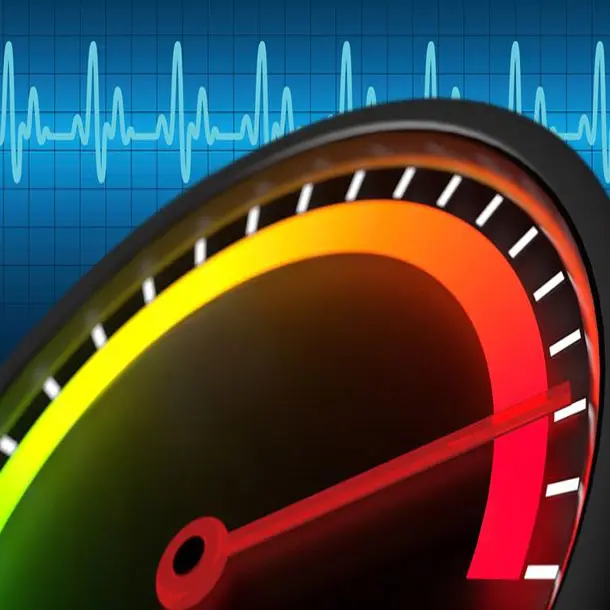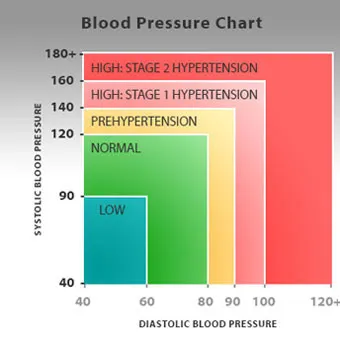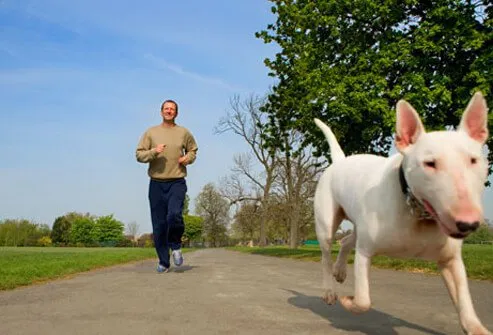What is blood pressure?

Blood pressure is the force applied by the blood to the inner walls of the arteries. There can be minor fluctuations throughout the day—declining while relaxing and momentarily increasing while being excited or under stress. An increase in resting blood pressure can scar, stiffen, or harden the arteries. If you have high blood pressure or risk factors for it, it is important to understand the blood pressure chart and ways to lower your blood pressure.
The different blood pressure levels and hypertension (high blood pressure) are shown in the chart below:
What is high blood pressure (hypertension)?

High blood pressure or hypertension affects 122 million Americans. It is often called “the silent killer” because as many as 16 million Americans are unaware they have the condition. Untreated hypertension can increase the risk of heart disease or stroke. High blood pressure occurs due to the tightening of very small blood vessels called arterioles. As a result, the heart has to pump harder to overcome the resistance in the narrowed blood vessel bed. This leads to elevated pressure inside the vessels.
- High blood pressure or hypertension is when readings consistently range from 140 or higher for systolic or 90 or higher for diastolic.
- Blood pressure readings above 180/120 mmHg are dangerously high and require immediate medical attention.
High blood pressure is more likely to cause the following:
- Heart attack
- Stroke
- Heart failure
- Vision loss
- Kidney disease or failure
- Dementia
- Sexual dysfunction (erectile dysfunction in men or low sex drive in women)
- Weak bones
- Vision loss
- Angina (chest pain)
- Peripheral artery disease (PAD)
How to lower blood pressure quickly
If you face any complications of high blood pressure such as a stroke or heart attack, contact your physician immediately. Do not attempt home remedies to lower blood pressure in such grave situations.
If you have high blood pressure (hypertension) without complications, ask your doctor if the following stress reduction techniques are appropriate for you. The first thing to do to lower blood pressure fast is to calm down and lie flat. Leave aside the task you were engaged in and slowly start taking deep breaths. This stress-relieving technique may help lower blood pressure to a certain extent. In addition to deep breathing exercises, other methods that may help reduce stress and lower blood pressure include: taking a short walk, acupuncture, drinking hibiscus tea, and getting some sun.
If calming techniques don't help, consult a physician immediately. Additionally, take your antihypertensive medications for high blood pressure that is uncontrolled by lifestyle changes and diet.
Medication is the main option for treating high blood pressure. There are also many natural ways to maintain healthy blood pressure in the long run. As blood pressure improves with lifestyle modifications, medications can be withdrawn gradually. Medications in combination with a healthy diet reduce the risk of a stroke, a heart attack, and other complications.
How to lower your blood pressure immediately without medication
There are a few tips you can try to lower your blood pressure immediately without medication:
- A 60-second trick to lower blood pressure immediately is to take a deep breath and try to relax. Stress and anxiety can raise your blood pressure, so taking a moment to calm down can help lower it. Learn breath exercises that slow your heart rate and promote relaxation.
- Drink some water. Dehydration can cause your blood pressure to rise, so drinking a glass of water can help lower blood pressure.
- Try some mild physical activity. Going for a walk or doing some light stretching can help lower your blood pressure immediately.
- Eat some dark chocolate. Dark chocolate contains flavonoids, which have been shown to lower blood pressure. Just be sure to eat it in moderation.
- Take a cold shower. Cold water can calm you down and help you relax, which can lower your blood pressure.
- Get some sun. There is a link between sun exposure and blood pressure. One study found that 30 minutes of exposure to UVA rays reduced blood pressure by an average of 4.90 mmHg.
- Drink beetroot and apple juice. One trial found that a drink containing beetroot and apple juice helped lower high blood pressure.
- Drink hibiscus tea. Drinking hibiscus tea daily can help manage chronic hypertension.
- Acupuncture. One study found that acupuncture therapy every other day for a month helped lower high blood pressure.
These methods may only provide temporary relief and are not a substitute for medical treatment for high blood pressure. If you are concerned about your blood pressure, speak with a healthcare provider. They can recommend a treatment plan that is appropriate for you.

SLIDESHOW
How to Lower Blood Pressure: Exercise and Tips See SlideshowHow do you get the bottom blood pressure number down?
When it comes to blood pressure readings, the top number is called systolic blood pressure and the bottom number is diastolic blood pressure. Systolic blood pressure is the pressure exerted by the blood on the walls of your arteries when your heart is pumping blood and diastolic pressure is the pressure when the heart is filling with blood and is in a relaxed state.
To get your diastolic blood pressure to go down, you can't target it alone. You will need to work on getting your overall blood pressure lower.
13 ways to lower your blood pressure
Here are 13 heart-healthy lifestyle practices that can help prevent high blood pressure and lower your risk for heart disease and stroke.
- Maintain a healthy weight
- Being overweight or obese is a major risk factor for high blood pressure. You will need to maintain a body mass index (BMI) between 18.5 to 24.9 kg/m2. Weight loss has been the most effective way of reducing blood pressure. Lose weight if you are overweight or obese.
- Reduce central obesity
- Excess fat around the waistline puts you at risk of hypertension and related heart disease. You can reduce the fat around your middle through various exercises, including jogging, walking, hiking, rowing, swimming, and high-intensity interval training (HIIT).
- Stay physically active
- The American Heart Association (AHA) recommends 90-150 minutes of physical activity spread throughout the week or a minimum of 30 minutes each day for at least 5 days a week. Daily exercise is an excellent way to lose weight and reduce high blood pressure. Exercising daily for 30 minutes can bring down the blood pressure by about 5-8 mmHg.
- Quit smoking
- Smoking causes the buildup of plaque in the blood vessels which leads to high blood pressure. Quit smoking and avoid exposure to secondhand smoke. Ask your doctor if you need help figuring out the best way to do this. Joining a program designed to help you quit smoking may help.
- Get enough sleep
- Manage stress
- Stress releases hormones that temporarily raise blood pressure. Stress hormone, or cortisol, constricts blood vessels and can lead to temporary spikes in blood pressure. Stress can also result in overeating, poor sleep, and misuse or abuse of drugs and alcohol. Manage stress by doing activities that relax you and make you feel good. These may include simple things like taking long nature walks, listening to music, or pursuing hobbies you enjoy. You can also try deep breathing and meditation techniques.
- Eat heart-healthy foods
- Include heart-healthy foods in your diet such as:
- Spinach
- Broccoli
- Carrots
- Apples
- Oranges
- Bananas
- Whole grains
- Nuts
- Beans
- Tofu
- Fat-free or low-fat dairy products
- Eggs
- Fatty fish
- Lean meat
- Skinless chicken or turkey
- Eggs
- Include heart-healthy foods in your diet such as:
- Stay away from saturated and trans fats
- Avoid foods loaded with sodium, cholesterol, and saturated and trans fats, like fast food, fried food, and instant and frozen foods. This approach to stopping hypertension by dietary control is known as the dietary approach to stop hypertension (DASH).
- Reduce your sodium intake
- Keep an eye on how much salt you eat, since salt can increase blood pressure. Limit salt intake to 1,500 milligrams or less per day. Avoid packaged, processed foods that typically contain more sodium. Most Americans consume about 3,400 mg of sodium a day, whereas the recommended daily intake of sodium is 2,300 mg with an optimal limit of less than 1,500 mg for those with high blood pressure.
- Increase your potassium intake
- Potassium can counteract the effects of sodium on blood pressure. Include potassium-rich foods in your daily diet, like bananas and spinach.
- Avoid too much sugar
- Cut back or eliminate caffeine and alcohol consumption
- Caffeine can increase blood pressure. If you are suffering from high blood pressure already, avoid anything containing caffeine before exercising.
- Drink alcohol in moderation or not at all. Avoid binge drinking. Consumption of 5 or more drinks by men, or 4 or more drinks by women, in one single occasion is defined as binge drinking. In addition to driving blood pressure up, binge drinking is associated with many other chronic diseases and risks such as alcohol poisoning, accidental injuries, and violence. If you are healthy, follow these general guidelines for alcohol drinking:
- Men: no more than 2 drinks per day
- Women: no more than 1 drink per day
- Take medications as prescribed
- Take your blood pressure medications as prescribed. To avoid skipping them by accident, set reminders on your phone to make sure you take them on time. Consult with your healthcare provider if your blood pressure remains high despite following a healthy lifestyle, and taking your medications. You may need a change in your treatment plan.
Health News
- Almost 10 Million Pounds of Meat Recalled Due to Listeria Danger
- Could Certain Genes Help You Slim Down?
- About 6% of Adults Have ADHD, Drug Shortages Are Affecting Treatment
- All Those Head Spins By Breakdancers Could Be Harming Them
- Injected 'Nanodiscs' Could Bring Brain Stimulation Therapy Without Implants
 More Health News »
More Health News »
Frequently asked questions (FAQs) about lowering blood pressure
How to cure high blood pressure in 3 minutes
If you have a sudden spike in blood pressure, stop all physical activity, drink some water, lie down flat, and take conscious deep breaths to make yourself calm. If your blood pressure does not come down in a few minutes, contact your physician immediately.
How to bring down blood pressure directly
The first step to lower blood pressure quickly is to keep calm and lie down. If you are taking treatment for hypertension, take your usual medication at the scheduled time. If you have already taken your medication and your blood pressure stays high, contact your physician promptly.
Does drinking water lower blood pressure?
Yes, dehydration can raise blood pressure and drinking water can help lower it.
Can I lower blood pressure by losing weight?
Weight loss is a primary step in the control of high blood pressure. If you are overweight or obese, losing even a few pounds can lower your blood pressure and have a beneficial impact on overall health.
What are three easy exercises to lower blood pressure immediately?
Deep breathing exercises, a gentle walk, or mild stretching exercises are three easy exercises to do that can help lower blood pressure immediately.
What are some natural ways to lower blood pressure?
Some natural ways you can follow to lower blood pressure:
- Learn deep breathing exercises and calming techniques like yoga and meditation and practice them regularly.
- Follow a heart-healthy lifestyle including a regimen of recommended exercises, diet, and weight management.
- Avoid or limit alcohol, processed foods, and beverages. Instead, eat more whole grains, fresh fruits, and vegetables, and drink water or healthy beverages like apple juice, pomegranate juice, beet juice, or low-fat or fat-free milk.
- Stress is an inevitable part of life. Learn to manage stress, and if necessary, seek professional help.
What foods lower blood pressure?
Foods rich in potassium can lower blood pressure. Potassium-rich foods include:
- Fruits such as bananas, melons, avocadoes, oranges, and apricots
- Green leafy vegetables such as spinach and kale
- Vegetables such as potatoes and sweet potatoes
- Lima Beans
- Fat-free yogurt
- Tuna and salmon
- Mushrooms
- Beans
- Nuts and seeds
What are the other ways to lower blood pressure?
Other measures you can follow to control your blood pressure:
- Regularly monitor blood pressure at home to make sure it is normal. Monitoring at home also helps avoid unnecessary doctor visits and stress that may occur in a clinical setting. However, do not miss your regular health check-ups with your healthcare provider.
- Take your antihypertensive medications on time. Set an alarm to avoid forgetting, if necessary.
- Seek prompt medical treatment if home measures fail to control your blood pressure within a short time.
https://hhma.org/how-can-i-lower-my-blood-pressure-immediately/
Centers for Disease Control and Prevention. “High Blood Pressure.” Updated: Aug 29, 2023. https://www.cdc.gov/bloodpressure/index.htm
NIH National Heart, Lung, and Blood Institute. “High Blood Pressure.” Updated: Mar 24, 2022. https://www.nhlbi.nih.gov/health/high-blood-pressure
National Council on Aging. “Diet &Nutrition for Older Adults: What to Drink When You Have High Blood Pressure.” Updated: Feb 14, 2024. https://www.ncoa.org/article/what-to-drink-when-you-have-high-blood-pressure
https://healthpolicy.usc.edu/evidence-base/many-americans-wrongly-assume-they-understand-what-normal-blood-pressure-is-and-that-false-confidence-can-be-deadly/
https://www.healthyandnaturalworld.com/lower-blood-pressure-quickly/
Top How to Lower My Blood Pressure Immediately Related Articles

Understanding Blood Pressure Chart Readings by Age
Blood pressure is the force applied by the blood over the inner walls of the arteries. Although the average blood pressure for a person remains constant, it shows minor fluctuations throughout the day—declining while relaxing and momentarily increasing while being excited or under stress. An increase in resting blood pressure can scar, stiffen, or harden the arteries.
How Can I Lower My Blood Pressure Immediately, Naturally? Chart
Can you lower your high blood pressure immediately? Explore 9 ways such as exercise, healthy eating, rest, and more that can help protect your arteries from blood pressure changes as you age. See chart and learn to manage and control hypertension the healthy and natural way.
High Blood Pressure (Hypertension)
High blood pressure (hypertension) occurs due to the tightening or stiffness of very small arteries called arterioles. As a result, the heart pumps harder through the stiff or narrow arterioles, leading to elevated pressure inside the vessels. Hypertension is known as 'the silent killer' because it often goes unnoticed and may cause serious complications such as kidney diseases, heart diseases, heart failure, and stroke.
High Blood Pressure & Body
High blood pressure puts you at risk for a number of other conditions. Here's what to look out for.
What Is High Blood Pressure (Hypertension)? Symptoms, Treatments
What causes high blood pressure (hypertension)? What is normal blood pressure? Know the warning signs and symptoms of high blood pressure. Read about high blood pressure medications, diet, and long-term treatments.
HBP Quiz
Take this quiz and test your IQ of high blood pressure (hypertension), the cardiovascular disease that causes most strokes and heart attacks. How are dizziness, snoring, and gout related to HBP? Find the answer and learn how medical treatments and lifestyle adjustments fight this common problem.
How Can I Lower My Blood Pressure in Minutes?
Learn how to lower your high blood pressure quickly and fast in just minutes. Learn how to better manage high blood pressure.
Is 110/60 a Too Low Blood Pressure?
A blood pressure reading of 110/60 mmHg is usually not considered a low blood pressure.
Is 120 Over 60 a Good Blood Pressure Reading?
If your systolic blood pressure is normal (between 100-120), and your diastolic blood pressure is lower (60 or below), you are considered to have low blood pressure, or isolated diastolic hypotension. Low diastolic blood pressure should be monitored closely.
Is 150 Over 90 a Good Blood Pressure?
Blood pressure of 150/90 mmHg comes under the category of stage I hypertension and means that you have high blood pressure.
Low Blood Pressure (Hypotension)
Low blood pressure (hypotension) is blood pressure that is so low that it causes low flow of blood through the arteries and veins. Some of the symptoms of low blood pressure include light-headedness, dizziness, and fainting if not enough blood is getting to the brain. Diseases and medications can also cause low blood pressure. When the flow of blood is too low to deliver enough oxygen and nutrients to vital organs such as the brain, heart, and kidneys; the organs do not function normally and may be permanently damaged.
How to Lower Blood Pressure: Exercise and Tips
Trying to lower high blood pressure (hypertension)? Discover exercises good for lowering blood pressure, along with other lifestyle changes and medications to prevent high blood pressure.
What Is Normal Blood Pressure for a 60-Year-Old?
According to current guidelines from the American Heart Association, normal blood pressure for adults under the age of 65 is any blood pressure below 120/80 mmHg.
What Is the Proper Way to Take Your Blood Pressure?
If you want to monitor your blood pressure on a regular basis, you can do so at home easily using an automated or digital blood pressure machine. Here’s how to make sure your at-home reading is accurate.
Why Is My Bottom Blood Pressure Number High?
Isolated diastolic hypertension (IDH) occurs when your systolic blood pressure is normal, and only your diastolic blood pressure is high (over 80 mm Hg). Causes of high diastolic blood pressure include a high-sodium diet, obesity, lack of physical activity, excessive alcohol consumption, stress and anxiety.